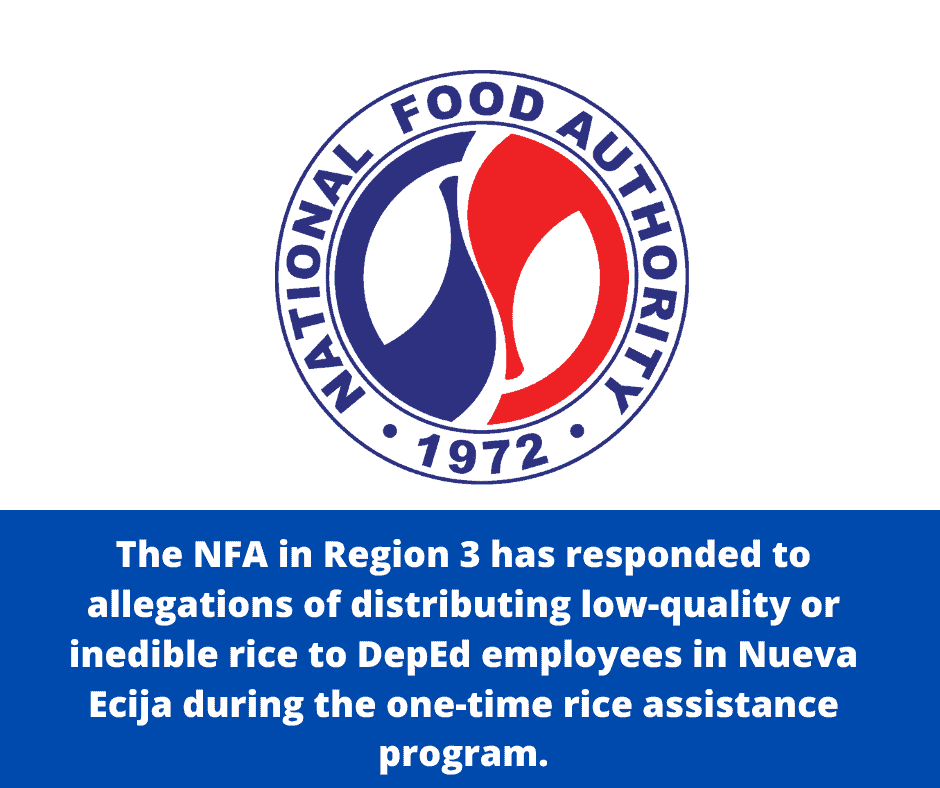The National Food Authority (NFA) in Region 3, specifically Central Luzon, has responded to allegations regarding the distribution of poor-quality or inedible rice as part of the one-time rice assistance program for employees of the Department of Education (DepEd) in Nueva Ecija. The agency released a statement on Wednesday, stating that laboratory tests and investigations were conducted to verify the accuracy of the complaint.
According to the NFA, no negative feedback was received during the interviews regarding the quality of the distributed NFA rice. Instead, the agency claims that the implementation of the program was appreciated. The agency asserted that all rice issued thus far was found to be edible, in good condition, and safe for human consumption. Additionally, the NFA reported that no formal complaints had been filed or registered to any of the offices of NFA Region 3.
Related: Why Filipino Teachers are Choosing Southeast Asian Countries
The agency’s response comes in light of earlier reports regarding the distribution of rice in the province. The NFA Region 3 obtained a certification from the concerned agency beneficiaries, affirming that all NFA rice stocks received were of good quality and accurate weight.

The NFA has implemented several strategies to ensure the quality of the rice being distributed. Quality Assurance Officers (QAOs) have been assigned to draw rice samples and present them to the assigned focal person, confirming the rice’s type, condition, and quality before issuance. The focal person of each agency beneficiary is also requested to witness the rice issuance to verify its quality and quantity based on the provided number of qualified beneficiaries.
The NFA clarified that their rice is an ordinary variety, milled from locally procured play, and conforms to the specifications of well-milled quality rice. They explained that NFA rice might possess a slight smell due to storage in warehouses as buffer stock.
Read more: Procurement of Public School Textbooks in the Philippines Faces Delays and Quality Challenges.
The agency emphasized that necessary quality management measures have been implemented to ensure that all rice stocks for issuance are of good quality and fit for human consumption, as evidenced by regular laboratory analysis.
In cases where wrong orders are issued, the NFA Region 3 assures immediate replacement and delivery of the same to the concerned agency beneficiaries. The regional and branch offices have taken action on the issues raised by anonymous complainants through the 8888 hotline and other print and digital media. These actions have been reported to the NFA Central Office for further consideration.
The NFA appeals for understanding from the public. It emphasizes its commitment to adhering strictly to the guidelines prescribed by the Central Office to maintain the quality and safety of the distributed rice.
Read more: 5 Government Agencies in the Philippines Offering Scholarships for Filipino Students.
What is the Rice Allowance for Teachers?
The rice allowance for teachers in the Philippines is an important benefit that aims to support the financial well-being of educators across the country. Recognizing the significant role teachers play in shaping the future of the nation, the government implemented this program to provide assistance specifically for the purchase of rice.
Under this scheme, qualified teachers receive a monthly rice allowance as a supplement to their regular salary. The allowance is intended to help alleviate the burden of rising food prices and ensure that teachers have access to an essential staple in their daily meals. The amount of the rice allowance may vary depending on factors such as the teacher’s location and the prevailing cost of rice in their area.
This initiative reflects the government’s commitment to supporting the welfare and needs of its teachers, acknowledging their dedication and hard work in molding young minds. The rice allowance serves as a valuable contribution to improving the overall well-being of teachers, enabling them to focus on their vital role in educating the nation’s youth.


